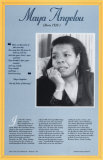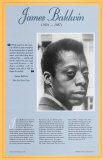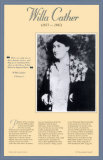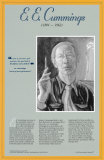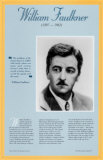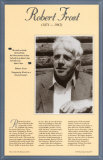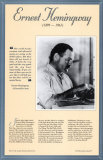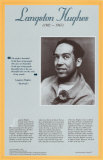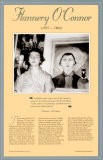|
|
|
|
|
|
|
|
|
James Baldwin
b. 8-2-1924; New York City
d. 12-1-1987
“White people in this country will have quite enough to do in learning how to accept and love themselves and each other, and when they have achieved this -- which will not be tomorrow and may very well be never -- the Negro problem will no longer exist, for it will no longer be needed.” - The Fire Next Time
James Baldwin is known for his writings about African Americans living in a world controlled mainly by whites. His novels, exxays and plays made him a key figure in the civil rights movement of the 1960s. James Arthur Baldwin was born in Harlem in New York City, the first of his family's nine children. By his early 20s, he was writing essays that were published in several national magazines. His first novel, Go Tell It on the Mountain (1953), is about the troubles of a black family and is based somewhat on his own youth and the painful relationship he had with his stepfather. In 1955, he published Notes of a Native Son, his first book of essays. Notes of a Native Son focused on the poverty and prejudice constantly faced by many African Americans. Two other essay collections, Nobody Knows My Name (1961) and The Fire Next Time (1963), contain some of his most powerful writing about the struggles between blacks and whites. His other books about racial tensions and bigotry include Another Country (1962), Tell Me How Long the Train's Been Gone (1968), and the play Blues for Mr. Charlie (1964). He also wrote short stories and children's books. He died at the age of 63.
• more James Baldwin posters
• more African American Authors posters
|
|
|
|
|
|
|
e. e. cummings
b. 10-14-1894; Massachusetts
d. 9-3-1962; New Hampshire
Poster Text: “next to of course god america i love you land of the pilgrims' and so forth oh”
E.E. Cummings was one of the twentieth century's most creative poets, and he is often remembered for his offbeat use of vocabulary and punctuation. Cummings often paid no attention to the rules of grammar and punctuation, sometimes making up completely new words and running words and sentences together. A printer once made a mistake and wrote his name in all lowercase letters. Cummings liked it, and from that time on, he signed all of his work “e.e. cummings.”
Although he is most famous for his poetry, Cummings was also a painter and playwright. His first book of poetry, Tulips and Chimneys, was published in 1923. Before this, he worked as a volunteer ambulance driver in World War One. During this time, he was falsely accused of being on the enemy's side and was imprisoned for three month in a military detention camp. From his experiences there, he wrote The Enormous Room (1922), a fictional account of the cruel forces of war. Some critics say The Enormous Room is one of the best books to come out of World War One era. Edward Estlin Cummings was born in 1894 in Cambridge, Massachusetts and died in 1962 at the age of 67.
FYI - the image in this poster is a self portrait by E. E. Cummings, oil on canvas, 1958.
• e. e. cummings at Amazon.com
• Poetry Forms posters
|
|
|
|
William Faulkner
b. 9-25-1897; Mississippi
d. 7-6-1962
“The problems of the human heart in conflict with itself ... alone can make good writing because only that is worth writing about, worth the agony and the sweat.”
• 1949 Nobel Prize for Literature
• more William Faulkner posters
|
|
|
|
|
|
|
Robert Frost
b. 3-26-1874; California
d. 1-29-1963
“The woods are lovely, dark and deep.
But I have promises to keep,
And miles to go before I sleep,
And miles to go before I sleep.”
Stopping by the Woods on a Snowy Evening
• Robert Frost posters
• Poetry Forms posters
|
|
|
|
Ernest Hemingway
b. 7-21-1889; Oak Park, IL
d. 7-2-1961
“The world breaks every one and afterward many are strong at the broken places. But those that will not break it kills. It kills the very good and the very gentle and the very brave impartially. If you are none of these you can be sure it will kill you too but there will be no special hurry.”
A Farewell to Arms
• more Ernest Hemingway posters
• 1954 Nobel Prize for Literature
|
|
|
|
Langston Hughes
b. 2-1-1902; Joplin, Missouri
d. 5-22-1967; NY
“The night is beautiful,
So the faces of my people,
The stars are beautiful,
So the eyes of my people,
Beautiful also is the sun,
Beautiful also are the souls of my people.”
My People
Langston Hughes was the biggest literary star of the Harlem Renaissance. He produced a truly astonishing amount of writing in his lifetime: sixteen books of poetry, twenty plays, seven collections of short fiction, many magazine and newspaper articles, three autobiographies, and two novels, as well as opera librettos, movie scripts, essays, and children's books.
James Mercer Langston Hughes was born on February 1, 1902, in Joplin, Missouri. His parents split up soon after, and Hughes grew up all over the Midwest. He enrolled at Columbia University in New York City, but he dropped out after a year. After that, he worked as a sailor and traveled the world, and he wrote poems and stories.
Hughes' poem “The Weary Blues,” which was written after a visit to a Harlem nightclub, was the first poem to use blues music form. It won first prize in an Opportunity magazine contest. When his first book of poetry, also called The Weary Blues, was published in 1926, the 24-year-old was suddenly a celebrity.
Hughes soon moved to Harlem; eventually, he adopted the neighborhood as his permanent home. He used street slang and jazz rhythms in blues-based poems like “Theme for English B” and the stories in The Ways of White Folks. Langston Hughes had come to be known as “The Poet Laureate of Harlem” by the time he died on May 22, 1967. (poster text)
• more Langston Hughes posters
• Poetry Forms posters
|
|
|
|
Flannery O’Connor
b. 3-25-1925; Savannah, Georgia
d. 8-3-1964; Georgia
Poster Text: “Anything that comes out of the South is going to be called grotesque by the Northern reader, unless it is grotesque, in which case it is going to be called realistic.”
The novels and stories of Flannery O'Connor are about life in the rural South. They are full of strange characters who often have emotional or spiritual problems and are obsessed with religion. However, O'Connor's writing is also full of humor, irony and satire. She wrote about people she knew – country judges, farmers, peddlers – and she is said to have been a shrewd listener who loved to keep track of people's converations for later use in her writing. She was an expert at using rural southern speech, settings and characters in her stories. Sadly, at age 25, Flannery O'Connor was diagnosed with lupus, a rare and incurable blood disease that had killed her father at a young age. After the diagonsis, she lived a very restricted life, writing stories and raising peacocks on her mother's Georgia farm. When whe died at age 39, O'Connor had already completed two novels, Wise Blood (1952) and The Violent Bear It Away (1960), as well as thirty-one stories. Her two collections of short stories are A Good Man Is Hard To Find (1955) and Everything That Rises Must Converge (1965), published after her death. The stories in these two collections were included in Flannery O'Connor: The Complete Stories (1971), which won the 1972 National Book Award for fiction.
Flannery O'Connor Reader
• more Women Writers posters
• Flannery O’Connor at Amazon.com
• Flannery O'Connor: A Brief Biography
• The thought of Pierre Teilhard de Chardin was important to Flannery O'Connor.
|
|
|
|
John Steinbeck
b. 2-27-1902; Salinas, California
d. 12-20-1968; CT
John Steinbeck, who examined the lives of the working class and the migrant worker during the Great Depression through his novels, was the winner of the Nobel Prize for Literature in 1962 “for his realistic and imaginative writings, combining as they do sympathetic humour and keen social perception”. Steinbeck wrote Of Mice and Men (1937) and his Pulitzer Prize-winning novel The Grapes of Wrath (1940).
Grapes of Wrath, cited for “vulgar language,” was burned by the St. Louis public library. Steinbeck's classic Of Mice and Men has been described as a “filthy book” by Tennessee officials, and banned from a public school in Ohio in 1980.
FYI - Steinbeck fictionalized marine biologist and ecologist Ed Ricketts' lab in Cannery Row.
Steinbeck also wrote “Travels with Charley: In Search of America”, a travelogue recounting tales of a 1960 road trip with his French standard poodle, Charley, in a camper he called Rocinante after Don Quixote's horse.
John Steinbeck quotes ~
• “The writer is delegated to declare and to celebrate man's proven capacity for greatness of heart and spirit — for gallantry in defeat — for courage, compassion and love. In the endless war against weakness and despair, these are the bright rally-flags of hope and of emulation. I hold that a writer who does not passionately believe in the perfectibility of man has no dedication nor any membership in literature.” Nobel Prize Acceptance Speech, 1962
• “A sad soul can kill quicker than a germ.”
• “I have come to believe that a great teacher is a great artist and that there are as few as there are any other great artists. Teaching might even be the greatest of the arts since the medium is the human mind and spirit.”
• “Ideas are like rabbits. You get a couple and learn how to handle them, and pretty soon you have a dozen.”Interview with Robert van Gelder (April 1947), as quoted in John Steinbeck : A Biography (1994) by Jay Parini
• “It is a common experience that a problem difficult at night is resolved in the morning after the committee of sleep has worked on it.”
• “If you're in trouble, or hurt or need - go to the poor people. They're the only ones that'll help - the only ones.”
• “Power does not corrupt. Fear corrupts... perhaps the fear of a loss of power.”
• “I've seen a look in dogs' eyes, a quickly vanishing look of amazed contempt, and I am convinced that basically dogs think humans are nuts.”
• “What good men most biologists are, the tenors of the scientific world — temperamental, moody, lecherous, loud-laughing, and healthy. Your true biologist will sing you a song as loud and off-key as will a blacksmith, for he knows that morals are too often diagnostic of prostatitis and stomach ulcers. Sometimes he may proliferate a little too much in all directions, but he is as easy to kill as any other organism, and meanwhile he is very good company, and at least he does not confuse a low hormone productivity with moral ethics.” The Log from the Sea of Cortez, 1951
• History Through Literature- Grapes of Wrath poster
• John Steinbeck at Amazon.com
|
|
|
previous page | top
|
|
I have searched the web for visual, text, and manipulative curriculum support materials - teaching posters, art prints, maps, charts, calendars, books and educational toys featuring famous people, places and events - to help teachers optimize their valuable time and budget.
Browsing the subject areas at NetPosterWorks.com is a learning experience where educators can plan context rich environments while comparing prices, special discounts, framing options and shipping from educational resources.
Thank you for starting your search for inspirational, motivational, and educational posters and learning materials at NetPosterWorks.com. If you need help please contact us.
|
|
|
|
|







